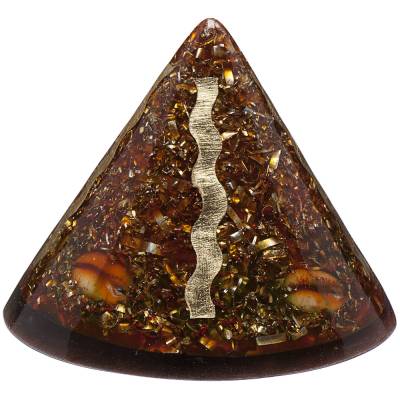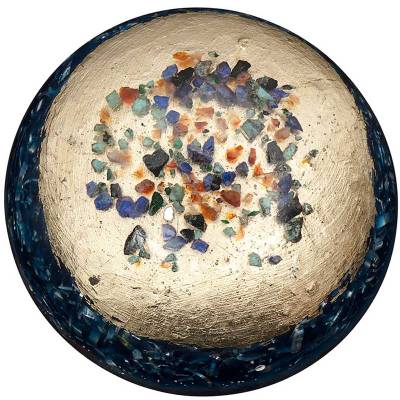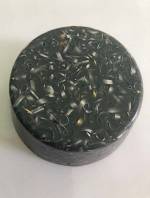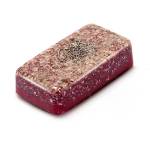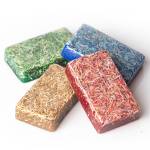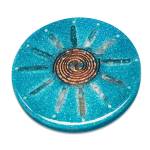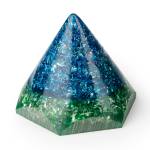Local Storage seems to be disabled in your browser.
For the best experience on our site, be sure to turn on Local Storage in your browser.
Worse before getting better
Orgonite team lingers in prison
Shattered hopes
Instead of TV cameras and officials with smiling faces, happy to end this embarrassing episode, we found ourselves in an unspeakable holding cell under the broad formal staircase of the High Court and Provincial State Prosecution Building in Tete. That after having waited in a hallway in front of the prosecutor's office for 2 hours for some paper work to be processed. Only briefly did we get to see Nhantumbo before being locked away and he told us we would go to the "Civil Prison" in Tete (Cadeia Civil) and he was still optimistic, saying "This is your way out!"Little did we know..Oh my God about 20 people on 20 m2, one of them with a fresh untreated gunshot wound to his knee, whimpering in pain. No toilet. The prisoners had designated an area for that. Oh the stink! It was really hard to breathe. After hours under these painful conditions where some prisoners were called out and the heavy steel door slammed shut again, we were led out as well. We were brought to a truck where the load area was converted to a steel cage with primitive benches. It was driven by a prisoner. We later got to know him better. Paulo was the first guy that really looked like a hard core criminal, tattoos all over and all the bells and whistles. We did not feel too good at this stage. The diary that I kept in these ensuing days has been lost, so I will rather report on these days in Tete as it comes to mind.Caravan-Serai bizarre A pity that we could not take photos. Now I have to try and recreate the bizarre scenery that awaited us at "La Cadeia Civil do Tete". On the outside a quite nice looking white washed building with a large double winged wooden gate, inside the prison was a dirty square yard surrounded by cell buildings. Surrounded by 6 meter high walls the square looked vaguely like a market place in some Suaheli town in Tanzania. Densely populated by about 800 prisoners, the place looked like some market place, only with no goods to sell. There was a raised podium with a corrugated iron roof that looked like people could sell fish or meat there, but it was referred to as "the church". While most of the square was just plain dusty trampled and eroded soil with remnants of erstwhile paving still visible to the "archeologically trained eye", the wardens had managed to fence in a little square of green grass where 3 trees including a palm tree were projecting a somewhat tropical image. This was in front of the admin block and strictly guarded. Nobody was allowed to trample on the grass.A "Hotel Tropicana" with limited leisure options...After we had already somewhat accommodated ourselves to the prison in Songo with its much smaller population, this was of course first frightening. The mass of prisoners alone. We were cowering in a corner under armed guard and were here finally stripped of our remaining personal belongings. The last orgone pendants and zappers that had still managed to keep in Songo were taken away. Bad luck as our health was slowly going down of course. Just after we had been delivered to the prison, the Mozambican TV team that had already interviewed us in Songo arrived. Our incarceration was restaged for the camera again. That's how news is made, in case you didn't know. After being processed in this way (they wanted to shave off Prophet's formidable dread locks, an idea they only gave up after an intervention of Nhantumbo) we were introduced to our cell bosses. (chefe do cela) This was a pleasant surprise. They had quite an organised system in this prison. Apart from the "chefe do cela", with general responsibility for the cell, there was a "chefe do segurança", responsible for self policing of the inmates under his jurisdiction and a "chefe do higiene" who was responsible for keeping the cell, especially the ablutions, clean. The relation between prisoners and wardens was very different here than in Songo. Most of the time the 5 or 6 wardens on duty would sit on the small porch of the admin block, overlooking the prison yard. Rarely would they be found mingling with the prisoners. An economy of power and control. They were much more defensive, outnumbered as they were by the mass of prisoners and always carried guns. My cell boss, Aurelio Rato turned out to be a very decent man. He was a school teacher in Songo before he got thrown in this slammer, for beating up his girlfriend under the influence of alcohol. Apart from this one time lapse with fatal consequences he had been a "valuable member of society" for most of his life, having - amongst other merits - founded and chaired a charity that looked after the sick and destitute. His subjects were art and mathematics and he was even in prison still teaching classes in these subjects. They had a programme of alphabetization going were prisoners with little education could at least learn basic literacy on grade 4 level. He still had 2 years to go but was adamant that he would try and continue his studies at university after getting out. Generally our relation to fellow inmates was quite good and after getting to know the main players of this weird society behind walls we never felt threatened by other prisoners that despite the fact that due to our status as "terrorism suspects" we were crowded in with "Rape, Murder and Armed Robbery" suspects and convicted alike. Surely our fellow inmates were not all angels, but we never witnessed open violence of any sorts. The cell where Prophet and I were brought was about 5 x 7 metres (for nominally 92 prisoners!) and hat a small chamber of 3 x 1 metres that served as a "casa do bagno". Rests of tiling and old plumbing outlets showed that it must once have had something like modern sanitary installations. Maybe there once was a functioning toilet and certainly a wash hand basin. Not so any more. The toilet part was reduced to squatting over the end of the sewage pipe and trying to hit it without soiling the floor too much. Later the "chefe do higiene" had a low brick wall buit around that with a somewhat bowl shaped cement screed that made it easier. The flushing was done by bucket same for showering. Amazingly about 70% of the prisoners were keeping themselves very clean even under these conditions. The other 30% were the ones that had given themselves up. Those are the ones that die of "AIDS" or rather malnutrition and a lacking desire to live. The bathroom was always busy and this Muzungu (yours truly) needed to let all his relations play in order to book a slot for some private hygiene during the day. The overcrowding was enormous of course. These cells had been originally designated for maximum 15 prisoners. Of the 92 prisoners assigned to our cell, about 20 were allowed to sleep outside, either because they had the coveted "sick card" (tuberculosis was rife of course, we had 5 or 6 cases of open tuberculosis in our cell alone) or because they were somewhat trusted by the wardens, convicted long term prisoners who did not want to ruin their chances of early release by futile attempts at escape. Now, please, don't expect this to be anything like the prisons you know from American movies, ok? No beds, no blankets, no prison clothes. You just sleep on the floor with whatever you have. with 70-something inmates on 35 square metres that gives you half a square as your personal snoozing ground. Not much privacy there. Life on the slave ships must have been similar if you want to call that life. Only the slaves were kept in the dark as well and in their own excrement, so that half of them were normally dead on arrival. Here the death rate was a bit slower as we still got to see the sky every day, so we witnessed "only" about 4 or 5 prisoners passing away from malnutrition and disease during our stay. Private property was allowed in the cells and it was even possible to buy bamboo mats, some of which were manufactured by prisoners inside, some brought in from outside. Some prisoners even had thin foam matreses and blankets. After a while I was allowed to share a mattress with Daniel who later became "chefe do higiene". My customary sleeping place was close to the cell door but also close to the toilet (the smell!) Sometimes I felt a rat crawling over me at night and once I woke up at such an occasion and -still half asleep- tossed that nasty rodent into the heap of slumbering cell mates, crying or rather shrieking aloud "um rato - um rato!" I earned a lot of lasting mockery with that one. There were of course 1000s of the little buggers crawling all over the place always in search of some remnants of food. They were equally at home in the decrepit sewage system and surely not exactly purveyors of good health. People who received visitors from outside had private food of course, which they kept in bags, suspended from the floor. In fact without that extra food, one would have died from malnutrition in no time, as the prison only provided maize porridge (Nshima), rice and beans. Whatever other supplies were delivered to the prison and paid for by the state, were immediately parcelled out amongst the wardens. As a result, prisoners without outside connections saw meat or vegetables maybe once a year.Living like kings (relatively spoken) We still had access to money. The money, that had been confiscated from us was deposited in the office and could be withdrawn in small amounts of maximum 500 meticais per day. This allowed us to live in relative luxury. There was a little tuck shop, run by prisoners (under corrupt license of one particular warden) that sold some essentials. Cigarettes, (I smoked like a chimney while in prison) matches, small sachets of "Omo" washing powder for the flourishing laundry industry, razor blades (!), sweets, little manuscript books, sweets, toothpaste and toothbrushes (that lost their bristles after 3 days) and a few more small items also tea and sodas. But the real nice thing was their breakfast. Every morning we would go and collect a thermos of sweet tea, (sugar is comforting under these circumstances) "Zama-Zama biscuits with artificial almond aroma and (most delicious of all) a bread roll with a fried egg inside. Wow, what a start for another day in the slammer! But lunch was beating it all! Dr. Nhanthumbo was feeding us real delicacies. Every day his wife or their maid would come and bring us a basket with rice (nicely cooked with saffron and curry), chicken or fish and sometimes meat. Also always 4 cans of ice cold soda. I'm sure we were the envy of the whole prison. Our daily routine The cells were opened at sunrise. Then we were allowed to go outside and start the day by shaking out the stiff limbs and having our breakfast. By about 7:30 we had to be back in the cells to be counted in a roll call. (Chamada) The names were called up by the "chefe de seguranca" in presence of a warden and one had to confirm one's continued presence by saying "pronto!" or "sto!" (I'm here) in a loud and clear voice. I later learned to enlarge that to "Sto contra vontad" just for the record. (It means: "I'm here against my will") On some days (no recognisable pattern there) we had to line up in the yard and sing the national anthem ("Mozambique e nossa terra gloriosa..." - Mozambique is our glorious country...) After the morning chamada we were essentially left alone for the rest of the day until about 6 pm when we had to re-enter the cells for another roll call. We were trying to stay together as a group even though this was not always easy. The tension of our uncertain future was gnawing away at us and one or the other, we sometimes lost our nerves a bit. (I guess that's natural under the circumstances) After a while we had our own bamboo mat and a somewhat respected space for it near our cell which would now be our social centre and convening place. What really helped wiling the time away was the fact that we got access to a chess board. I never played as much chess as in Tete in my life and we all improved our game considerably. Prophet had only started learning it in Songo and became quite good at it. Tino was our strongest player, with Carlos and me being roughly equal. There were quite few champions amongst the fellow inmates, so at times we had really interesting tournaments going. Naturally, because of our limited knowledge of Portuguese we hung out a lot with English speaking prisoners, mostly from Zimbabwe or Malawi. But we also befriended some of the Mozambican inmates. After the evening chamada we were supposed to stay in the cells, on normal days with open cell doors. That was the worst part of the day always. Even with the open cell doors the sweat was running in rivers and the overcrowded situation made any relaxation or even playing chess impossible. From time to time sadistic wardens even took away that little cooling and locked the door.We later learned that they did tha to extract money from prisoners. For 15 meticais you could buy the right to stay outside until final roll call. Not for us though, the terrorism suspects. On other evenings, with friendlier wardens on duty, we were allowed to sit in front of the cell as long as we did not move away.Battle by media – the top guns get involved While this was all unfolding around us, the media storm that had already started during our last days in Songo was gaining Momentum. President Armand Guebuza had gone on record, cautioning the media not to jump to foregone conclusions, but soon made clear that he was going to maintain a neutral position. "let the proper authorities deal with the case" was the mantra. The Mozambican Prime Minister, Mrs. Luísa Dias Diogo, was much more outspoken in stating publicly that we were obviously innocent. Obviously the results of new tests that had now been conducted in Maputo had been leaked to the press. Soon thereafter a TV talk show on prime time National TV dealt with our case. The sociologist was most probably Carlos Serra, who has taken quite an interest in our story. If you can read Portuguese, I recommend you check out his blog. Since we did not have access to TV (some privileged prisoners did) we got it only from hearsay. A member of parliament, a sociologist and a chemist were discussing our case and somehow all agreeing that is was ridiculous to have us locked up and that the country was opening itself up for all kind of compensation claims apart from the potential diplomatic fallout with Germany and Portugal. This is an understandable reaction for normal, intelligent people with a heart who are not yet woken up to the fact that of course al governments are in this together behind the scenes. References to our incarceration appeared in the press all over the world, most of them of course denouncing us as some kind of "New Age Cult" (brings up associations of Charles Manson or the CIA fabricated mass murder made to look as a mass suicide at Jonestown). One Mozambican newspaper, the weekly independent "Savana" was making a big difference. Their reporters really took the pains of investigating the story deeply. So we made frontpage News there with the title:

"Ridiculous - like in a bad movie" If you can read Portuguese check out Savana here. My hat is off in reverence to these courageous and uninhibited journalists. Here is a broad but incomplete selection of further news clippings in reaction to our story: BBC allafrica.com Legalbrief highbeam.com Cape Times architectafrica.com You can get a picture of the spectrum of reactions if you just type the words "sabotage cahora bassa" or the Portuguese version "sabotagem cahora bassa" in your favourite search engine.
Betrayal or business as usual - Love your lawyer but never trust him
Dr. Nhantumbo had been the focus of all our hopes and we initially loved him to bits. He is a good looking, intelligent, well articulated and lively African man.
We felt that he had true sympathy with our case and there was a bond of friendship developing. After we had been transferred to Tete, he visited us more often and, as stated before, he fed us well.
But then things started taking a strange direction: In the first days he gave us the impression that it could only be a matter of days until the prosecution would drop the nonsensical allegation and set us free. Of course his daddy already having been a judge i tete he's a well connected man in the legal scene of Tete province. His sister is prosecutor in Songo where we were first arrested and held for more than 3 weeks.
Things were dragging on and on and we were now told that "things had to cool off a bit" first, because Mozambique had to do a face saving operation, couldn't be seen to cave in to foreign pressure or public opinion too easily. The more we were surprised when the formal accusation was handed to us by a clerk of the court.
It contained 4 accusations:
1. The crime of "altering goods destined for public consumption" (read water contamination)
2. The crime of Sabotage (punishable with 8-16 years imprisonment)
3. The crime of smuggling (the orgonite)
4. The crime of conducting unauthorised environmental activities
It turned out that the tests conducted in Maputo, while confirming that the orgonite was essentially what we said it was, still came to hair-raising conclusions about the alleged potential toxicity.
Ridiculous when one considers that most of the boats on Cahora Bassa are made of very similar resin in the form of fibreglass and together represent 100s of tons of such resin.Polyester resin bound fibreglass is actually used for drinking water tanks. It was clear that the sparse and scant laboratory results had been garnished with politically inspired drivel that was presented as part of the report.
The laboratory tests that were allegedly conducted in South Africa were not presented as part of the evidence.
While we were pondering these accusations and trying to gather evidence to counter them point by point, we would have expected our dear Dr. Nhantumbo to engage in a flurry of activities, visiting us at least daily (we had 5 days to come up with a counter motion)
But Nhantumbo did not come once in this critical period.
Not once.
Our tension was rising to frantic state. On a sunday in that period a great surprise happened:
We were visited by my friend Fungai who had come to bring additional evidence and liaise with Nhantumbo.
Through him I learnt that Nhantumbo, instead of working on our case, had been hectically haggling with Friederike over a fee demand of 35,000 US Dollar.
Wow! We knew nothing about that and had been cut off from communication by Nhantumbos absence, because he was able to receive messages and forward them to us and also to fax our letters to Friederike who would distribute them to the others.
We also learnt from Fungai that there was nothing in writing that could be called a "counter motion" on Nhantumbo's desk.
In fact he told us that Nhantumbo was barely in his office but rather running around to do all kinds of other things. Certainly we never saw a draft or a copy of any written submission that Nhantumbo may have made.
Was it all a racket?
Was Nhantumbo playing both sides?
Was he the mediator for a corrupt settlement with the equally corrupt represantatives of state power?
On the day of the deadline I suddenly received a very wellcome visit from Mr. von Chamier, an official of the German consulate in Mozambique.
He came with Nhantumbo who pretended all was in order between us. Since we had the advantage of speaking in German, and von Chamier was fully briefed by Friederike, we could talk openly about our concerns about the non-action regarding the deadline and a mounting suspicion of our dear lawyer being up to something fishy.
He must have sensed this or maybe he understands more German than he wanted to let us know.
Suddenly Nhantumbo was in a great hurry to submit the counter motion in time (whatever it may have been that he submitted there, because we have never seen it) We confronted him on the story after we had the information and told him to do business WITH US, not behind our backs. Intuitively I told him we would go for 20,000 since we were all grown ups and capable to enter agreements.
I didn't have near that money but we were able to pay some 8000 then. The Rest was promised as a success premium after our release.
My vehicle and boat were pledged as security. Now suddenly it all went very quickly and a few days later we were free! Of course we were happy but the situation was still awkward.
Our release was accompanied by the TV Cameras of Mozambican national TV again and a lot of Newspapers wanted interviews. We wanted nothing of it. For a few days we were personal guests of Nhantumbo in his apartment (I had expected a lavish house from a lawyer who deems himself worth 150 U$ an hour. That's a lot of money in Mozambique. 20K also is a lot of money)
My final verdict on the man is still out. I'm not judgemental.
Friederike thinks he's Belzebub impersonated.
We felt his genuine hospitality and desire to communicate with us.
In fact I think he spoke from his heart when he told us he's going to miss us as he has nobody in Tete to whom he could talk to in a broader view of things.
We met many of his friends and had barbecues with him at the construction site of his new house. We played with his lovely daughter and had dinner at home with him and his wife. Maybe a corrupt deal was the only way for us to end that episode and we should not bicker about the money of course. A deal is a deal. Nhantumbo really liked the orgonite (I'm sure he will eventually get hold of our confiscated stash and put it o good use in Mozambique) His prosecutor sister is wearing one of our zappers while she was also the one who proudly invented the phrasing "Alteration of goods destined for public consumption" that were used in the legalisation of our continued incarceration.
I was growing increasingly depressed as I was feeling that I was ending up paying the bill alone. Something I was not ready to accept at that point. I also did not know if I was ever going to see my Landrover and boat again. I also felt very strongly that suddenly every one of our group was overwhelmed by their own concerns and I was going to sit with that problem pretty much alone. (Except for Tino who pledged his part and had also contributed to other activities that were undertaken outside to facilitate our speedier release) As it became clear that nobody was going to come up with the rest of the 20K in time, we left per plane, leaving the landy and the boat in the custody of an acquaintance of Nhantumbo in the yard of a mechanic workshop, behind closed gates. I was later to retrieve the items (a test of courage for me to go back to Mozambique for that purpose, but no problem) by flying in with Fungai. (After full payment was done. As a little aside, this friend of Nhantumbo's charged me 3000 Meticais (then 100$) per day for parking the car. I had clearly understood 300. That's more expensive parking than in Manhattan where real estate is probably 100x as expensive.
TIA (This is Africa)
So, the whole experience was more confusing in the end than anything else. Was this orchestrated from higher up in order to discourage us from further such expeditions deeper into Africa? I guess it was at some level. I would imagine that someone in the dirty hierarchy of the secret services got us to be watched and got the whole "sabotage" and "terrorism" dimension thrown in.
For the rest they only had to let Mozambique’s corrupt and inefficient system take its course in order to effect enough "punishment without crime". Having no documet that really says charges against us were dropped, we have no legal recourse, no chance to sue for compensation or whatever.
The fact that the ending of it was without clear legal conclusion leaves us wondering as to what our legal status is now in Mozambique. Both I and Tino have visited Mozambique after this and nothing bad happened. So maybe we should assume it's all over. Sort of...
I guess it's a tacit understanding that we're not going to talk about it anymore and they not either.
I guess what it taught us again is that in Africa you're traditionally expected to ask the chief for permission if you want to do anything on the land over which he is lord.
This is still difficult for us to accept as we're used to the relative impersonality of relations between a government and it's underlings in the European tradition.
One would think, what we're doing is not really government business, but in a police state like Mozambique, everything is.
It took a while for me to comprehend this, but in Mozambique people are really afraid of "the authorities" like I haven't encountered it in any other African country. Already in 2005 when we gave a Cloud Buster to the traditional healer Alexander in Vilanculos, his greatest concern and fear was what the "authorities" would say about it.
The villagers near Cahora Bassa that Prophet and Carlos were showing the orgonite to, reacted the same way: "What would the authorities say to this?"
Since nobody in a country like Mozambique wants to take responsibility for a decision about something they don't know, it would mean you need to talk to the top, the president, the king over land and people.
Maybe that's what we need to do if we want to do more work in Mozambique.







